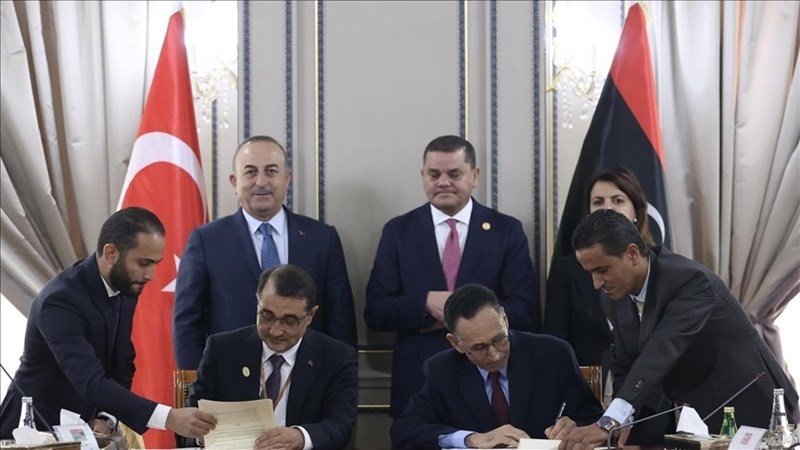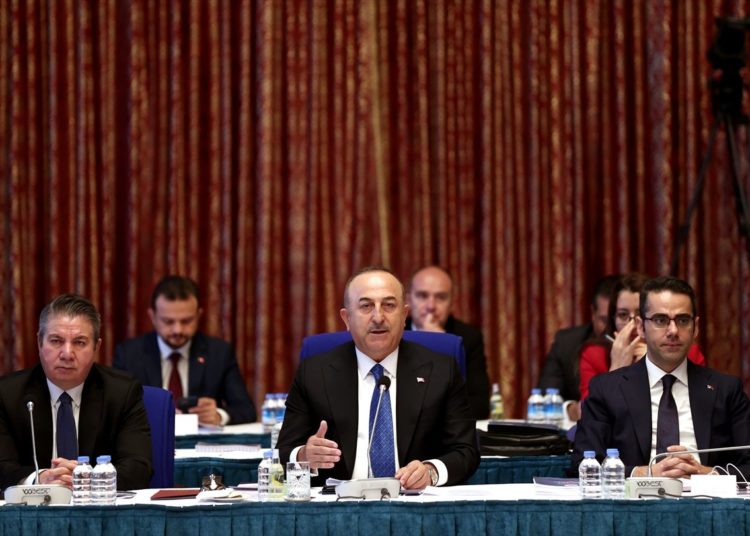Levent Kenez/ Stockholm
Turkish Foreign Minister Mevlüt Çavuşoğlu said at a Tuesday parliamentary committee meeting on his ministry’s 2023 budget that a maritime agreement signed between Turkey and Libya in 2019 is merely a memorandum and that it can’t be approved by the Libyan parliament.
Main opposition lawmaker and former ambassador Ünal Çeviköz had asked the minister what Turkey had done to make the officially titled “Memorandum of Understanding Between the Government of the Republic of Turkey and the Government of National Accord-State of Libya on Delimitation of the Maritime Jurisdiction Areas in the Mediterranean” legal and binding, reminding that the MOU signed with the Government of National Accord still has not been ratified by the Libyan parliament.
Çeviköz also raised the latest MOUs on energy exploration signed on October 3 in Tripoli and questioned whether it is valid in the unstable environment in Libya.
Çeviköz’s statements at the parliamentary committee:
Saying that it was wrong for Turkey to take sides between the forces in Libya for ideological reasons, Çeviköz added that Turkey has lost its role of mediator and damaged its reputation due to the mistakes it has made in Syria.
Responding to Çeviköz’s criticism, Çavuşoğlu stated that interim Libyan governments were established under UN initiatives and that these governments are not authorized to sign international agreements but are able to sign memorandums. He also told deputies that Turkey approved the 2019 memorandum in its own parliament because the MOU included the establishment of an economic zone in the Mediterranean Sea. The Turkish parliament, however, was already approving MOUs signed with foreign countries.
Stating that the interim governments in Libya do not have an obligation to have the memorandums approved by the parliament, Çavuşoğlu added that similar to Turkey, Egypt also signed MOUs with Libya and the speaker of Libya’s House of Representatives, Aguila Saleh, did not feel the need to put the memorandums up for parliamentary approval despite the fact that he is close to Egypt.
Çavuşoğlu also said Turkey has developed relations not only with the UN-backed Tripoli government but also with the opposition forces in Tobruk.
Çavuşoğlu’s response to Çeviköz regarding the maritime memorandum:
Meanwhile, the Libyan Presidential Council on October 4 announced that the memorandum of understanding signed with Turkey by Abdel Hamid Dbeibah’s National Unity Government on energy exploration “must be approved by the Libyan legislative councils.”
Following the signature of the memorandum of understanding, Speaker Saleh reiterated his rejection of any agreement or memorandum of understanding signed by the Government of National Unity headed by Dbeibah.

It is no secret that in addition to supporting the Libyan government, which is ideologically close to him, Erdoğan has repeatedly said Libya’s oil and gas resources were important factors in Turkey’s interest in the country. Speaking at a joint news conference with Fayez al-Sarraj, the former prime minister of Libya’s UN-recognized Government of National Accord (GNA) in Ankara on June 4, 2020, Erdoğan revealed his plan for Libya’s oil reserves. “We aim to expand our cooperation including exploration and drilling operations to take advantage of natural resources in Libyan territory,” he said.
Nordic Monitor previously published a copy of the maritime agreement between Turkey and Libya that determines the Turkish-Libyan continental shelf and exclusive economic zone coordinates.
The agreement was the subject of criticism, especially by countries such as Egypt, Greece and Cyprus in the Mediterranean region.
The agreement states that both Turkey and Libya have determined a precise and equitable delimitation of their respective maritime areas in the Mediterranean in which the parties exercise sovereignty and sovereign rights and/or jurisdiction in accordance with the applicable rules of international law, taking into account all relevant circumstances.
It refers to achieving equitable and mutually acceptable solutions to the above-mentioned issues through constructive negotiations and in the spirit of good and friendly relations and says that the memorandum of understanding will contribute to the strengthening of relations and encourage further cooperation between the parties in the interest of the two brotherly countries.
Libya has been suffering from an escalating political crisis with a dispute between two governments. The first was headed by Fathi Bashagha, who won a vote of confidence in the Libyan House of Representatives, held in Tobruk, in the far east of the country last March.
The second is the Government of National Unity, which stems from political agreements sponsored by the United Nations more than two years ago, headed by Dbeibah, who refuses to hand over power except through presidential and parliamentary elections.












